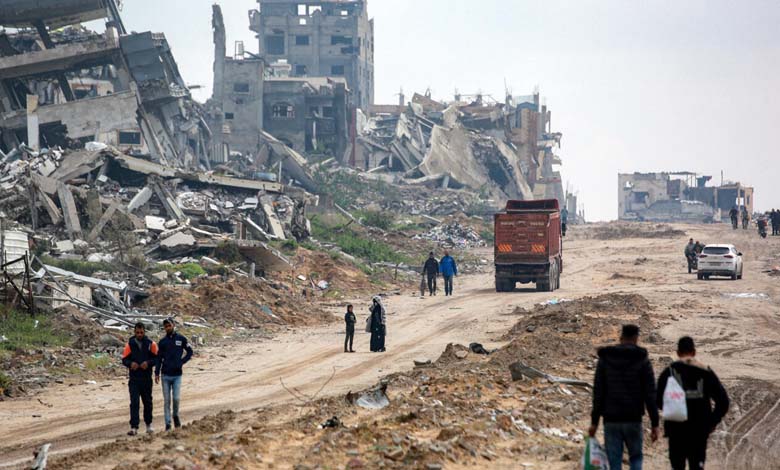Gaza Truce: Three Disputes Prevent a Ceasefire Agreement

As international efforts continue to end the war in Gaza, fundamental disagreements remain an obstacle to reaching a final ceasefire agreement between Israel and Hamas.
Egypt, Qatar, and the United States are working to bridge the gap between the two sides, but major hurdles persist.
-
Latest News from Gaza: Israel Expands Operations in the North Mass Exodus towards the South
-
Fatah Calls on Hamas to Leave the Government Scene: Have Mercy on Gaza and Its Children
According to Israeli sources, U.S. Middle East envoy Steve Wietkoff has put forward a new ceasefire proposal, which Hamas has accepted with certain amendments, while Israel has demanded additional changes.
Amid these negotiations, Israeli estimates suggest that 59 Israeli hostages remain in Gaza, with 24 believed to be alive and 35 presumed dead.
The main points of contention revolve around the number of hostages to be released, the timeline for the second phase, and Israel’s military preparations for a potential escalation.
-
“Netzarim” and “Salah al-Din” at the Heart of the Gaza Battle Again… Military Advance and Warning
-
From Gaza to the West Bank… Israel Draws Up “The Day after” Plans
Number of Hostages to Be Released
Israeli 12 News reported that Hamas is offering to release five hostages in exchange for a 50-day ceasefire, while Israel insists on the release of 11 live hostages—half of those believed to be alive—in return for a 40-day truce.
According to Israel Hayom, Hamas has agreed to Wietkoff’s proposal to release five live Israeli hostages in exchange for a prolonged ceasefire. However, Israel has rejected this, demanding adherence to the original framework, which stipulates that half of the living hostages must be released at the start of the second-phase discussions.
-
Gaza Truce: ‘Obstacles’ Threaten the Second Phase
-
“Tunnels and New Leaders”… Hamas “Prepares” for a Possible Return to War in Gaza
The newspaper adds that Israel is demanding verification mechanisms to ensure that humanitarian aid reaches Gaza’s civilians rather than Hamas, along with guarantees for the safety of all hostages during and after the truce.
An Israeli official noted that Hamas had shown unprecedented flexibility by agreeing to discuss releasing an additional five hostages, attributing this to military pressure and supply restrictions imposed on Gaza.
-
The Second Phase of the Gaza Agreement: Three Objectives behind the Choice of the “Keeper of Secrets”
-
Hourglass and Gold Piece… “The Sword of Time” accompanies Gaza hostages
Timeline for the Second Phase
This dispute concerns when negotiations for the second phase of the ceasefire agreement should begin.
While Hamas is demanding a clear Israeli commitment to initiating these talks, Israel has only stated that phase two negotiations will take place if Hamas accepts Wietkoff’s proposal, without providing explicit guarantees that they will be completed within 40-50 days.
-
Trump’s Gaza Storm: Arab Initiative Seeks an Alternative to Halt Forced Displacement
-
Gaza… The Besieged Treasure
Israeli Military Withdrawal and Guarantees Against Renewed Fighting
According to Israel’s public broadcaster, Hamas is demanding a complete withdrawal of Israeli forces from Gaza as part of the deal, an idea that Israel firmly rejects.
The Palestinian movement is also seeking international guarantees that Israel will not resume fighting once the truce ends—another demand that Tel Aviv refuses to accept.
-
After 8 Months of Closure… Here’s the Date for the Reopening of the Rafah Crossing between Egypt and Gaza
-
The Joy of Return and the Pain of Separation: Mixed Emotions for Northern Gaza Residents
Preparations for a Military Escalation
Israeli 12 News reported that the Israeli military is preparing for a series of large-scale operations if Hamas does not accept Israel’s proposal. These operations would include seizing more territory in Gaza and implementing additional measures to push the negotiations forward.
The news channel stated that Israel prefers to exhaust diplomatic efforts before launching a full-scale military campaign, a process that could take several weeks. Should negotiations collapse, Israel’s security establishment is prepared for what it calls the “defeat of Hamas.”
At this critical juncture, international mediators face the challenge of finding a compromise that allows both parties to reach an agreement, amid ongoing political and military tensions.
-
Return that Defies “Nakba”: Residents of Northern Gaza between the Silence of the Rubble and the Clamor of Memory
-
Gaza Ceasefire in Its Fourth Day: Doubts, Uncertainty, and Terrifying Gaps












